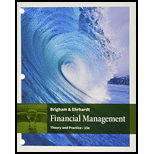
Bundle: Financial Management: Theory and Practice, Loose-leaf Version, 15th + Aplia, 1 term Printed Access Card
15th Edition
ISBN: 9781337130295
Author: Eugene F. Brigham, Michael C. Ehrhardt
Publisher: Cengage Learning
expand_more
expand_more
format_list_bulleted
Concept explainers
Question
Chapter 19, Problem 8Q
Summary Introduction
To discuss: The effects on cancellation clause have on the analysis on lessee and on lessor analysis.
Expert Solution & Answer
Want to see the full answer?
Check out a sample textbook solution
Students have asked these similar questions
image is blurr please comment i will write values then solve.Please don't solve i mistakely posted blurr image.
i will give unhelpful if answer is incorrect..
image is blurr please comment i will write values then solve.Please don't solve i mistakely posted blurr image.
i will give unhelpful if answer is incorrect..
You are thinking of inving in Tikki's
Torches, Inc. You have only the following
information on the at year-end 2008:
Net income0.000
Total debt
12.2 million
Debt ratio 42%
What is Tikki's ROE for 2008?
a. 1.79%
b. 10.14%
c. 3.09%
d. 4.26%
Chapter 19 Solutions
Bundle: Financial Management: Theory and Practice, Loose-leaf Version, 15th + Aplia, 1 term Printed Access Card
Knowledge Booster
Learn more about
Need a deep-dive on the concept behind this application? Look no further. Learn more about this topic, finance and related others by exploring similar questions and additional content below.Similar questions
- Crenshaw, Incorporated, is considering the purchase of a $367,000 computer with an economic life of five years. The computer will be fully depreciated over five years using the straight-line method. The market value of the computer will be $67,000 in five years. The computer will replace five office employees whose combined annual salaries are $112,000. The machine will also immediately lower the firm's required net working capital by $87,000. This amount of net working capital will need to be replaced once the machine is sold. The corporate tax rate is 22 percent. The appropriate discount rate is 15 percent. Calculate the NPV of this project. Note: Do not round intermediate calculations and round your answer to 2 decimal places, e.g., 32.16. NPV Answer is complete but not entirely correct. S 103,141.80arrow_forwardYour firm is contemplating the purchase of a new $610,000 computer-based order entry system. The system will be depreciated straight-line to zero over its five-year life. It will be worth $66,000 at the end of that time. You will save $240,000 before taxes per year in order processing costs, and you will be able to reduce working capital by $81,000 (this is a one-time reduction). If the tax rate is 21 percent, what is the IRR for this project? Note: Do not round intermediate calculations and enter your answer as a percent rounded to 2 decimal places, e.g., 32.16. IRR %arrow_forwardQUESTION 1 Examine the information provided below and answer the following question. (10 MARKS) The hockey stick model of start-up financing, illustrated by the diagram below, has received a lot of attention in the entrepreneurial finance literature (Cumming & Johan, 2013; Kaplan & Strömberg, 2014; Gompers & Lerner, 2020). The model is often used to describe the typical funding and growth trajectory of many startups. The model emphasizes three main stages, each of which reflects a different phase of growth, risk, and funding expectations. Entrepreneur, 3 F's Debt(banks & microfinance) Research Business angels/Angel Venture funds/Venture capitalists Merger, Acquisition Grants investors PO Public market Growth (revenue) Break even point Pide 1st round Expansion 2nd round 3rd round Research commercial idea Pre-seed Initial concept Seed Early Expansion Financial stage Late IPO Inception and prototype Figure 1. The hockey stick model of start-up financing (Lasrado & Lugmayr, 2013) REQUIRED:…arrow_forward
- critically discuss the hockey stick model of a start-up financing. In your response, explain the model and discibe its three main stages, highlighting the key characteristics of each stage in terms of growth, risk, and funding expectations.arrow_forwardSolve this problem please .arrow_forwardSolve this finance question.arrow_forward
arrow_back_ios
SEE MORE QUESTIONS
arrow_forward_ios
Recommended textbooks for you
 Intermediate Financial Management (MindTap Course...FinanceISBN:9781337395083Author:Eugene F. Brigham, Phillip R. DavesPublisher:Cengage Learning
Intermediate Financial Management (MindTap Course...FinanceISBN:9781337395083Author:Eugene F. Brigham, Phillip R. DavesPublisher:Cengage Learning Intermediate Accounting: Reporting And AnalysisAccountingISBN:9781337788281Author:James M. Wahlen, Jefferson P. Jones, Donald PagachPublisher:Cengage LearningBusiness Its Legal Ethical & Global EnvironmentAccountingISBN:9781305224414Author:JENNINGSPublisher:Cengage
Intermediate Accounting: Reporting And AnalysisAccountingISBN:9781337788281Author:James M. Wahlen, Jefferson P. Jones, Donald PagachPublisher:Cengage LearningBusiness Its Legal Ethical & Global EnvironmentAccountingISBN:9781305224414Author:JENNINGSPublisher:Cengage

Intermediate Financial Management (MindTap Course...
Finance
ISBN:9781337395083
Author:Eugene F. Brigham, Phillip R. Daves
Publisher:Cengage Learning

Intermediate Accounting: Reporting And Analysis
Accounting
ISBN:9781337788281
Author:James M. Wahlen, Jefferson P. Jones, Donald Pagach
Publisher:Cengage Learning

Business Its Legal Ethical & Global Environment
Accounting
ISBN:9781305224414
Author:JENNINGS
Publisher:Cengage